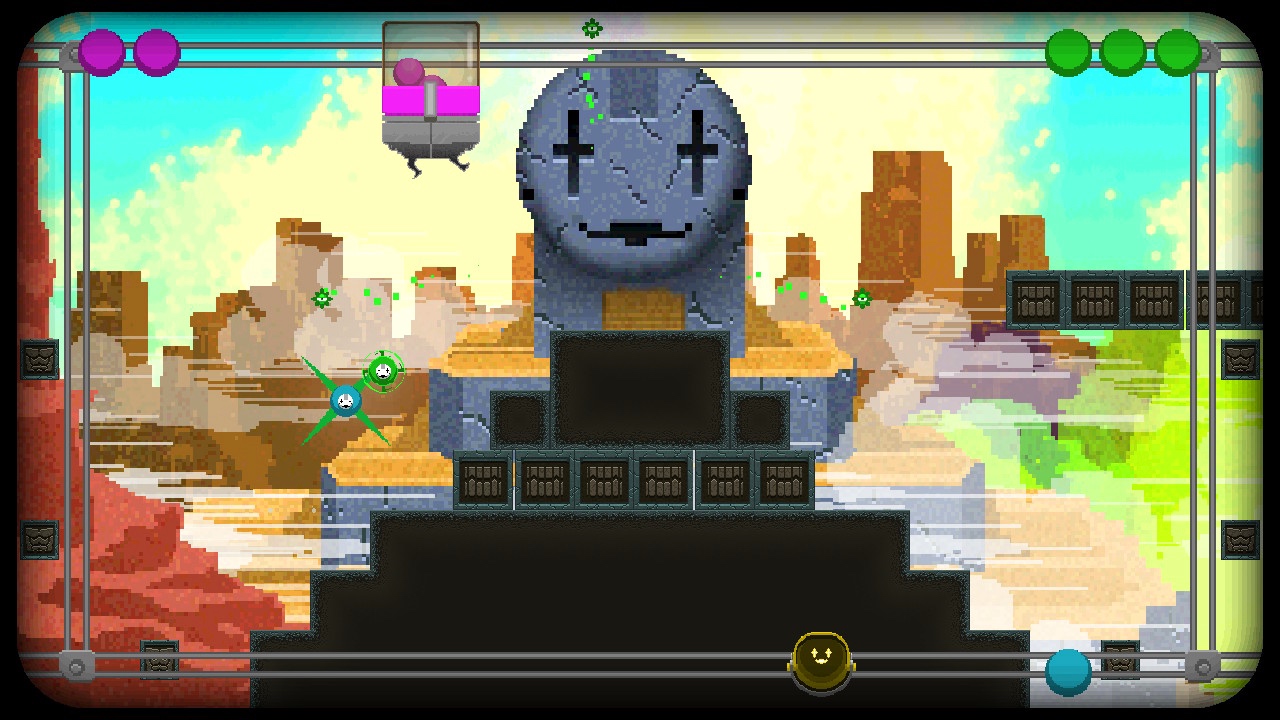One-button Smash Bros.
According to The Dangerous Kitchen’s Kickstarter for De Mambo, the developers made the game as a way to distract themselves from their hype surrounding the then-upcoming release of Super Smash Bros. for 3DS. They also attempted to boil down the Smash Bros. formula to its most simple and basic form.
I can’t say I’ve ever been so hyped for a game that I stopped reading about it on the internet and starting crowdfunding my own project, but these devs must have one hell of a Smash addiction; can’t blame them, it is very good.
But is De Mambo?

De Mambo (PC, PS4, Switch [reviewed])
Developer: The Dangerous Kitchen
Publisher: The Dangerous Kitchen
Released: July 13, 2017 (Switch), TBA (PC, PlayStation 4)
MSRP: $12.99
Removing combos, special modes, damage percentages, character differences, items, and all but one attack button from Super Smash Bros. would sort of give you De Mambo. The attack button can be pressed to poke out spikes from the ball-shaped characters in four directions, held momentarily to release a wider push in all directions, and long-pressed to charge up and release projectiles all over. Aside from that, players can jump three times in a row (twice while in the air), and holding down while airborne will make players’ balls drop quickly. Heh heh. Movement is a bit floaty and the speed at which characters move can sometimes feel as if it accelerates a bit too quickly to handle; two things that will certainly be points of contention for a lot of people.
The main focus of De Mambo is a multiplayer mode, which is made obvious by it being the first selection on the main menu. Here up to four local players battle to knock each other out of the stage across a plethora of unlockable stages with breakable walls. These walls must have a player forced into them at least a couple of times to break, thus allowing an opening for eliminations to occur. Some stages have moving pieces, others have water that allows players to move in any direction, and there is even one that is basically an homage to the popular Final Destination stage from Smash Bros.
Those looking to play by themselves will have to look to the solo or survival modes. Solo mode takes place across four sections separated out by difficulty. Each difficulty has specific stages, with over 70 total. In these stages, players are challenged to defeat enemies (which you don’t always have to knock off the screen), grab collectibles around the screen, or just simply get to the end of the stage; all within a specific time limit and number of lives. The difficulty scales as you’d expect, though I didn’t personally find any of the game all that challenging aside from a few stages that are restrictive time limit wise. The best part of solo mode is probably the bosses you’ll come across that require a mastery of the controls as well as some strategy. The entire solo mode can be finished in around about two hours, and while fun, it isn’t something I’d tell people to buy the game for alone.
Survival mode can be played with one to four players and is like a mix of De Mambo, Space Invaders, and Galaga. Enemies approach from the top of the screen while players defend a row of breakable blocks at the bottom with a goal of, you guessed it, surviving as long as possible. It is a nice addition to the overall package, but not anything all that exciting.
What I dig the most in this package is its retro wave-like visuals that are both simple yet stylistic; which will be another one of those things people either love or hate. What I like the least is the menu system. It requires players to press the A button to move between modes instead of just letting you use the stick like most every game on the market. As I bought this game from the Japanese store since it released there early and in English, I had no idea there even were solo and survival modes until I saw a post about it on the Japanese newsfeed on the Switch itself! That said, there is a giant A button right there on the main menu, but it just wasn’t obvious to me what that meant. I thought it selected the mode on the screen like the start button would.
De Mambo isn’t the next big fighting game, nor did it deliver on all its promised content from its Kickstarter as it had been stated there would be a Zelda II-like campaign mode which isn’t here, instead replaced by the short stage-based solo mode. That being said, I like De Mambo alright. It’s a fun distraction to casually play with friends — be they competitive or casual — and will perhaps help hold us all over till a proper Smash Bros. releases on the Switch; much like how the developers waited for a 3DS version. This is one fun little dance.
[This review is based on a retail build of the game purchased by the reviewer.]









